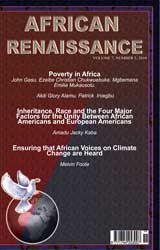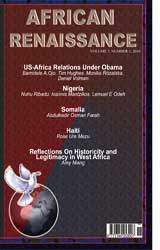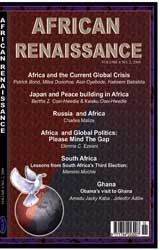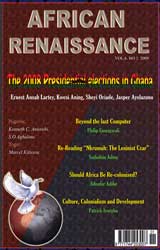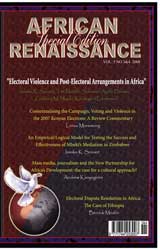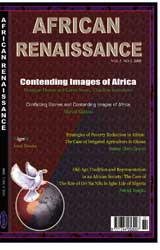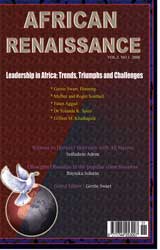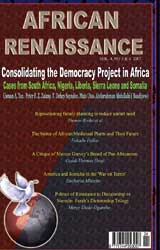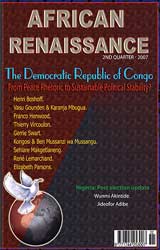
 editor@adonis-abbey.com
editor@adonis-abbey.com ![]() UK: 0207 795 8187 / Nigeria:+234 705 807 8841
UK: 0207 795 8187 / Nigeria:+234 705 807 8841

Publication Frequency: Quarterly (Four times a year) (ISSN 1744-2532 E- ISSN 2516-5305). SCImago Journal Ranking for 2024: Quartile: Q3; SJR: 0.165
View Table of Content
African Renaissance Volume 7 Number 2, 2010 (lead theme: Poverty in Africa)
In Volume 7 Number 1, of the journal, we discussed US-Africa relations under Barrack Obama. We posed and sought answers to the question of whether there has been any fundamental change in US policy towards Africa under Obama’s presidency. In this issue we focus on poverty in Africa, its ramifications and the various remedial measures in the continent. In Ghana where it is estimated that some 40% of the population are poor, John Gasu argues that the actors involved in poverty reduction programmes are critical to the expected outcomes. He points out the contradiction in the case of the Ghanaian state, which bears the responsibility for the social and economic malaise associated with poverty and yet is restrained by the dominant neo-liberal order from embarking on direct economic activity of its own to remedy the situation. Ezeibe Christian Chukwuebuka discusses the political economy of poverty and poverty alleviation programmes in Nigeria between 1999 and 2009, arguing that b...
View Table of Content
African Renaissance, Volume 6 Numbers 3 & 4, 2009 (Special issues: Yaradua: The Journey So far)
In Volume 6 Number 2, we looked at the impact of the current global economic crisis on Africa. We posed questions on the roots of the crisis; its possible impacts on Africa, and the ways Africa could wriggle itself out of the logjam. In this special issue, we focus on the Yaradua regime, which came into power in May Nigeria in 2007. Sunny Nwachukwu & Osumah Oarhe discuss the 2007 elections that brought the regime to power, and its implications for democratic consolidation in the country. They note that the conduct of the elections was fatally flawed with widespread voter intimidation, thuggery, violence, election rigging and outright falsification of collated results. For them, “since the government formed on the basis of the 2007 general election is based on fraud, the implication is that the government does not represent the people.” Ezeibe Christian Chukwuebuka discusses Yardua’s 7-point Agenda, noting that the Agenda on which the regime anchors its pu...
View Table of Content
Africa and the Current Global Financial Crisis (AR Vol 6 No 2, 2009)
In the last edition of the journal, we examined the recently concluded Ghanaian presidential elections, noting that the 2008 elections tested the institutional character of the electoral process in Ghana to its limit. We noted that while Ghana deserved every commendation for yet another successful democratic power transfer, the rave reviews of the elections, were rather too extravagant and masked events which nearly turned Ghana to another Kenya or Zimbabwe’ in Africa. In this issue, we look at the impact of the current global economic crisis on Africa. We posed questions on the roots of the crisis; its possible impacts on Africa, and the ways Africa could wriggle itself out of the logjam. Patrick Bond discusses the various reasons offered for the crisis in the US – from deregulation, corruption, greed, feckless borrowing by debt-addicted consumers and Alan Greenspan – to Conservative Ann Coulter blaming it on the banks “giving your...
View Table of Content
The 2008 Presidential elections in Ghana (African Renaissance Vol 6 No.1 2009)
In volume 5, No.3 & 4 2008 edition of the journal, we dealt with the issue of Electoral Violence and Post-Electoral Arrangements in Africa, noting that the end of the Cold War and big power rivalries in the late 1980s coincided with and/or contributed to the restoration or establishment of multiparty systems in most of Africa in what has been termed the ‘third wave of democratisation’. We also noted that the violence that followed what was apparently a peaceful presidential poll in Kenya in December 2007 and the circumstances that surrounded the 2008 presidential election in Zimbabwe seem to overshadow the view of many observers about the democratic process in Africa. In this issue, the first in 2009, we look closely at the recently concluded Ghanaian presidential elections. Ernest Ansah Lartey and Kwesi Anning give an insight into the emerging presidential transitional culture in Ghana’s political development. They note that the 2008 electi...
View Table of Content
Electoral Violence and Post-Electoral Arrangements in Africa (AR vol 5 Nos 3&4)
Introduction: Electoral Violence and Post-Electoral Arrangements in Africa Issaka K. Souaré (Guest Editor) Institute for Security Studies, Pretoria Guest Editor The end of the Cold War and big power rivalries in the late 1980s coincided with and/or contributed to the restoration or establishment of multiparty systems in most of Africa in what has been termed ‘third wave of democratisation’. This saw an opening up of political space and the formation or resurrection of opposition political parties in the region. Almost all the African countries south of the Sahara adopted new constitutions that reflected these developments, including the principle of regular legislative/parliamentary and presidential elections. As a result, many long-serving rulers have left power or been defeated at the polls (Diamond, 2007). But the violence that ensued the proclamation of an apparently peaceful presidential poll in Kenya in December 2007 and the circumstances that ...
View Table of Content
Contending images of Africa (African Renaissance Vol 5 No 2 2008)
Contending images of Africa In the last edition of the journal issue, we focused on the quality of leadership in the continent, looking at the challenges, triumphs and emerging trends in the continent. In this issue we look at the contending images of Africa, in the press and in the popular imaginations. Marcel Kitissou discusses a number of arenas and stories to illustrate this contending image. He notes for instance that while there were calls both from inside and outside Liberia for the former war lord Charles Taylor to be brought to justice, many West African leaders saw his indictment by the international court of justice as being of little help to Liberia. Their argument was that since Charles Taylor’s supporters had not disarmed, handing Taylor over to the court could trigger widespread violence, which would defeat the entire aim of his trial because for justice to be implemented, a sustainable peace was needed. He argues that ...
View Table of Content
Leadership in Africa: Trends, Triumphs and Challenges ((Guest Editor: Gerrie Swart)
From the Editor Leadership in Africa: Trends, Triumphs and Challenges Guest Editor: Gerrie Swart (Gerrie Swart, a lecturer in the Department of Political Sciences at the University of South Africa, (UNISA) is the Guest Editor of this volume. Gerrie, who has been a frequent contributor to the journal in the last year and half, solicited and ensured a timely delivery of all the articles in the lead theme in this edition. We are deeply grateful to him.) In Volume 4, numbers 3&4 of the journal, we discussed the major challenges to the democracy project in Africa, using South Africa, Nigeria, Liberia, Sierra Leone and Somalia as case studies. We posed some key questions: Are the current efforts at instituting liberal democracy and its ethos in Africa sustainable? What are the challenges facing the democracy project in Africa? How are they being negotiated? And what are the implications of all these for the fate of the democracy pr...
View Table of Content
African Renaissance Vol 4 Nos 3&4: Consolidating the Democracy Project in Africa: Cases from South Africa, Nigeria, Liberia, Sierra Leone and Somalia
In Volume 4 No 2 2007 edition of the journal, we focused on the Democratic Republic of Congo, often referred to as the DRC, and formerly known variously as the Congo Free State, Belgian Congo, The Congo, Congo/Leopoldville, Congo/Kinshasa and Zaire. The DRC is a country rent by ethnic strife and civil war since 1994, culminating in the First Congo War that toppled Mobutu in 1997. We noted that since 1998, the country has suffered greatly from the impacts of the devastating Second Congo War (sometimes referred to as the African World War), and believed to be the world's deadliest conflict since World War II. Contributors to the issue discussed these conflicts, efforts at mediation, and current talks of post conflict reconstructions. In this issue we discuss the major challenges to the democracy project in Africa, using South Africa, Nigeria, Liberia, Sierra Leone and Somalia as case studies. We pose a central question: Are the current efforts at institut...
View Table of Content
The Democratic Republic of Congo: From Peace Rhetoric to Sustainable Political Stability?
In the last issue of the journal (Volume 4, No1, 1st Quarter 2007), we focused on the Horn of Africa. We looked at the region, the problems of conflicts, dictatorships, wars, weapon proliferation, identity, and development trajectory. We asked some key questions: What political agendas, if any, do the competing historical narratives of ethnic identities serve in the region? How has the Cold War era super power rivalry affected the political configuration in the region? And how have all these affected the form of development thoughts, and development forms in the region? In this issue, we focus on the Democratic Republic of Congo, often referred to as the DRC, and formerly known variously as the Congo Free State, Belgian Congo, The Congo, Congo/Leopoldville, Congo/Kinshasa and Zaire. The DRC is a country rent by ethnic strife and civil war since 1994, culminating in the First Congo War that toppled Mobutu in 1997. Since 1998, the country has suffered greatl...
To subscribe to any of the journals, Please Email Us.




